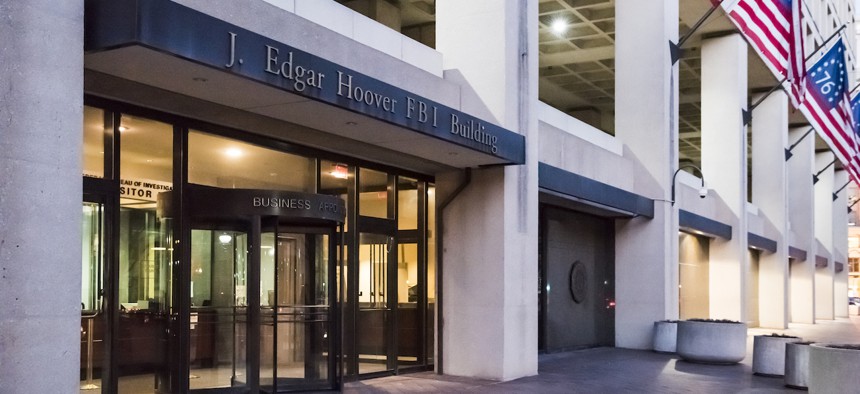FBI’s new headquarters plan was not influenced by the Trump White House, watchdog says

In July 2017, the FBI proposed demolishing the Hoover building, and rebuilding a new facility on the same site. ablokhin/Getty Images
An inspector general report four years in the making found that FBI officials nixed a plan to move its headquarters to suburban Washington, D.C., for reasons not related to alleged political pressure from the Trump administration.
The Justice Department’s inspector general has found that the FBI’s decision not to pursue a new headquarters outside the District of Columbia was due to a lack of funding and not allegations of political pressure from former President Donald Trump.
The report, first commissioned in 2019 and published Tuesday, examines the agency’s near two-decade plan to develop a headquarters to succeed the J. Edgar Hoover building, which, by 2016, appeared narrowed down to three sites in Springfield, Va., and Greenbelt and Landover, Md.
Potential site selection plans were moving forward under a procurement strategy where the FBI would finance construction by exchanging the site of the Hoover building with a developer, who would then fund the new headquarters as part of the swap.
However, the FBI canceled the exchange procurement plan in July 2017, citing cost concerns and later proposing to demolish the Hoover building instead and rebuild a new facility on the same site.
The move also sparked worries within the House Committee on Oversight and Reform and Committee on Transportation and Infrastructure that the White House had directed the cancelation to prevent a competing redevelopment down Pennsylvania Avenue from Trump’s then-named Trump International Hotel in the Old Post Office.
The committees directed the OIG to review the decision in June 2019, but Tuesday’s report confirmed FBI assertions that the decision to cancel the procurement strategy was not due to political pressure from the White House.
"We found no evidence that the FBI’s decision to seek to have its headquarters remain in its current location was based on improper considerations or motives,” the report said. “We found that [FBI Director Christopher] Wray testified credibly to the OIG about how he reached the decision independently and not as the result of any external pressure or influence.”
The report went on to note that contingent on the exchange procurement plan to move forward, the FBI and General Services Administration required additional funding. The Obama administration requested $1.4 billion for the project in its fiscal 2017 budget, but Congress only appropriated $523 million, leading FBI officials to question whether to move forward with the project.
After canceling the exchange strategy, FBI and GSA officials reexamined their options, including renovating the Hoover building or rebuilding a new headquarters on the same site.
The report showed that there were infrastructure concerns about each of the three suburban sites, including mass transit access at the Landover site, a lack of adequate building space at Greenbelt and the cost of relocating multiple government agencies at the Springfield site.
Wray decided that the FBI would remain at the Hoover site in December 2017, and GSA officials would later recommend demolishing the Hoover building and constructing a new headquarters.
However, the report said that the revised plan to keep the headquarters in D.C. contained limited security information about the new building, including whether it would address Interagency Security Committee standards that call for security countermeasures implemented at buildings deemed high risk.
The OIG said this was likely due to then-FBI Finance and Facilities Division Assistant Director Richard Haley and the Program Management Office “not sufficiently consulting the FBI Security Division” about facility security issues, which may have led to an “inadequate and unclear summary of the security posture” of the proposed facility in the revised plan.
Funding plans for the new headquarters at the Hoover site did not materialize in future congressional appropriations, but the fiscal 2022 Consolidated Appropriations Act directed GSA to select one of the three suburban sites for a new FBI building, albeit without new funding.
President Biden’s fiscal 2023 budget request said the FBI and GSA would identify a location for a “federally owned, modern and secure facility for at least 7,500 personnel in the suburbs” and the selection process would inform potential funding for the project in fiscal 2024.
The fiscal 2024 budget request called for $4.1 billion in funding combined from the proposed Federal Capital Revolving Fund and GSA appropriations to help construct a suburban headquarters. Under the request, the FBI would also use prior appropriations to identify and construct a downtown D.C. facility to house 750 to 1,000 agency personnel.
The federal government is currently operating under a continuing resolution while Congress is currently negotiating its fiscal 2024 budget.






